Enjoy a Fun Family Trip on the African Penguin Route
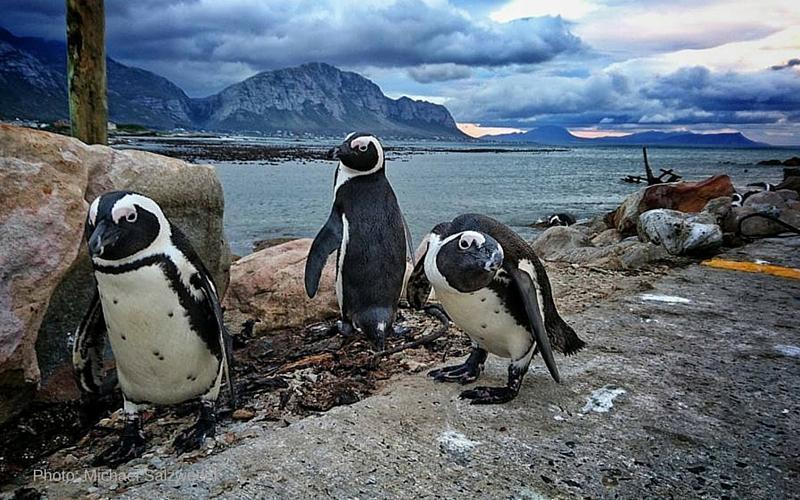
There are two kinds of family activities we absolutely love; the free ones (Don’t we all?) and the activities where we teach our kids to have fun while we invest in their future by investing in the environment- taking care of each other and nature through responsible tourism. Have family fun while you educate and inform yourself and your children on this route.
African penguins have lost their natural nesting habitat. According to their research during the mid 1800’s and early 1900's, guano was scraped from seabird islands and sold as fertilizer in Europe and the USA. African penguins nest by digging burrows in guano, laid down by seabirds over time. With this source being depleted, African penguins cannot burrow into the rocky islands and are forced to nest on the surface, leaving their eggs and offspring exposed to predation and the elements. .
1. SANCCOB – Table View, Cape Town
SA National Foundation for the Conservation of Coastal Birds is where injured or oiled sea birds (including penguins) have been captured, stabilised, treated, washed (if necessary) then maintained until waterproof & ready for release for the past 25 years.
Over 20 000 penguins were individually caught , hand-washed and fed for 3 weeks in penguin pens successfully in just one oil spill incident. These penguins were then transported by container trucks by road more than 8 hours to Port Elizabeth, released to swim back to Cape Town. By which time the oil spill had been cleaned up. Each oiled penguin is tagged after their wash so that they can be monitored in future. "Peter & Percy & Pamela" were 3 very special oiled penguins that were given satellite packs attached to their backs and released from Port Elizabeth. They were tracked by satellite as they made their way back down the coast to their original breeding ground, where the penguin colony re-established itself.
Visiting one of their two centres (Cape Town and Cape St Francis) is educational and fun.
SANCCOB Sea Bird Centre is open daily at feeding times: 10h00 & 15h00
Visit SANCCOB inside the Eco Marine Tent during the Hermanus Whale Festival
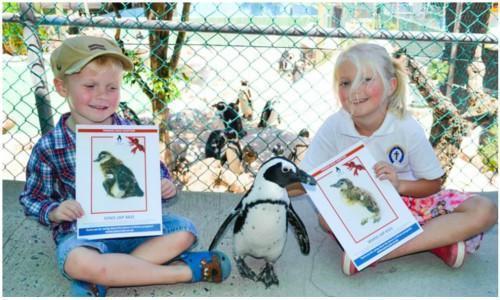
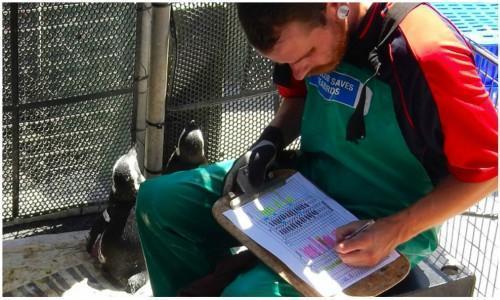
2. Boulders Beach in Simonstown, Cape Town
Boulders Beach is a sheltered beach made up of inlets between granite boulders, from which the name originated. An attractive destination during the summer months, but you will be able to see the penguins throughout the year. It is a great spot to set up camp for the day – your little ones will love climbing over the rocks and playing in the rock pools.
The place smells and sounds like you'd expect from a beach that's home to penguins. If you keep your eyes and ears to the ground, you'll locate some penguins nesting very close .However, the birds do spend much of September and October feeding out at sea, so the number of penguins on the beach at this time of year is lower. For a real treat, try to visit in January when the juvenile birds are moulting on the beach.
At the Boulders Visitors Centre, you’ll find information about the penguins and knowledgeable guides.
Entrance fee of R35 for adults and R10 for children under the age of 12. This gives access to the beach as well as the walkways and viewpoints.
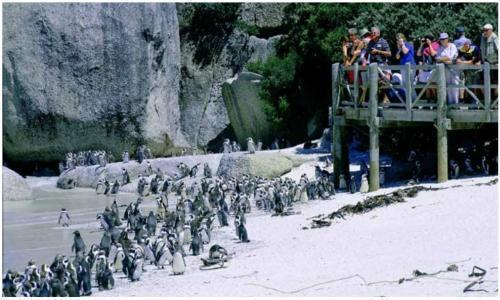
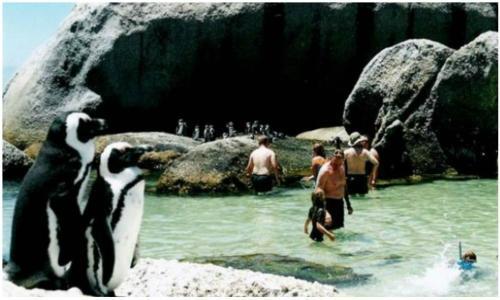
3. Stony Point in Bettiesbay
Stony Point is one of only three land based colonies in South Africa for the African Penguin. From the notice board at the entrance of this protected area you can find out a little bit more about what goes on at Stony Point. Breeding season takes place from February to October we discovered and mate for life – how cool is that! And both parents share the nesting and feeding duties! One modern coupleI won’t give away all the penguins secrets, you’ll need to visit yourself to find out all about them.
The Stony Point Penguin Colony is also used as a research and monitoring facility so some of the nests are colour coded, green indicating there are chicks and yellow indicating eggs. When you start to walk along the wooden boardwalk you will immediately spot penguins and nests in every direction. If you’re not familiar with what a penguin nest looks you’ll notice it by the little hole which is the entrance with a green leafy covering, some of the nests we looked into we could see the penguins curled up. Most nests had penguins all around them waddling as only penguins could do.
The restaurant inside one of the old whaling station buildings applicably had a fresh seafood menu. There is also a very informative picture history of the whaling and the Old Whaling Station, which was in operation from 1912 to 1930 at Stony Point.
They are open to the public from 9:00- 17:00 daily. Entrance fee R10 per person
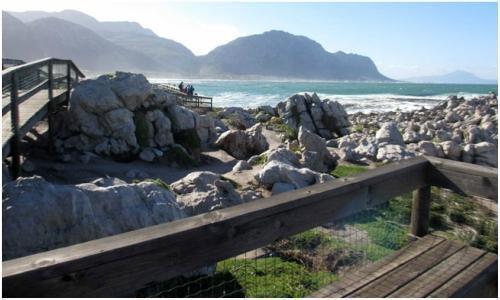
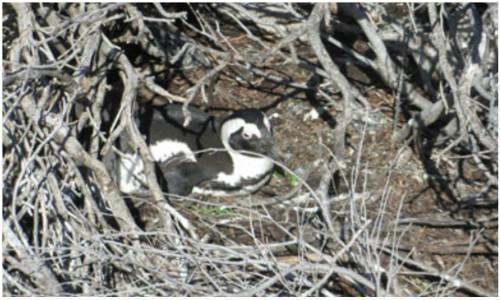
5. African Penguin and Seabird Sanctuary (APSS) in Kleinbaai
The Sanctuary offers viewing of the species that are in rehabilitation. This is not a zoo or animal touch farm, thus there is no guarantee that you will see a Penguin or Seabird when you visit, so consider phoning in advance. We were fortunate to see two penguins in rehabilitation but they were kept out of public’s eye for now, as they were still in sensitive stage of rehabilitation. The centre went the extra mile by installing cameras so we could still view them on the provided big screen.
APSS provide you with informative talks and curios as well as a coffee shop with freshly baked cakes. I would however like to encourage you not to only visit the centre but to really invest family time in this initiative by contributing to their projects. (Donations are welcome, and they are also in need of old towels and newspapers for their daily operations.)
They are open to the public from 9h00 – 16h00 daily. No entrance fee
Visit APSS in the Eco marine Tent during the Hermanus Whale Festival
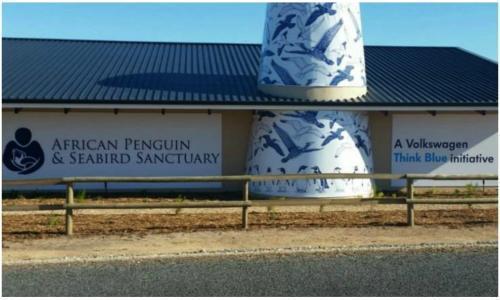
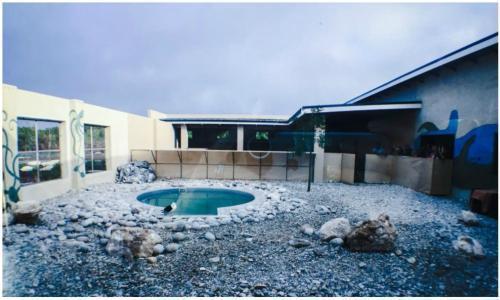
6. Off Shore Penguin Colony at Dyer Island
African penguins have lost their natural nesting habitat. According to their research during the mid 1800’s and early 1900's, guano was scraped from seabird islands and sold as fertilizer in Europe and the USA. African Penguins nest by digging burrows in guano, laid down by seabirds over time. With this source being depleted, African penguins cannot burrow into the rocky islands and are forced to nest on the surface, leaving their eggs and offspring exposed to predation and the elements. Cape Nature, in partnership with Dyer Island Conservation Trust, has embarked on a programme to install artificial penguin nests on Dyer Island and Stony Point. This provides shelter to eggs, parents, and chicks – the nests project was approved by WWF.
Marine Big 5 whale watching trips offered by Dyer Island Cruises, a boat based whale watching company operating from Kleinbaai , include viewing trips to Dyer Island as part of their tour. The island is under protection of Cape Nature and not accessible to the public but the penguins can be viewed in their natural habitat from the boat.
Boat trips are weather dependant and are part of the whale watching (in season) or eco marine trips.
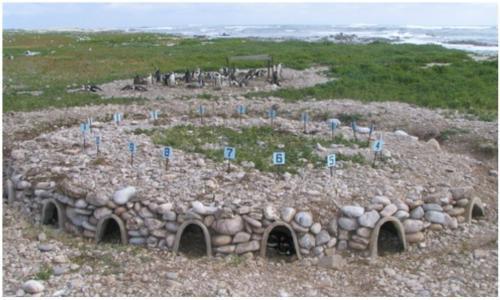
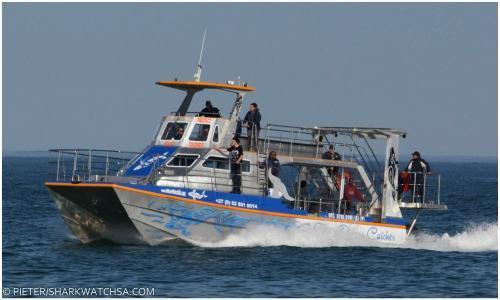
Call us and schedule your listing today! Contact Us
Copyright © 2025 Hermanus Online Magazine. Web Development by Jaydee media.
